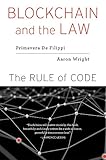Blockchain and the law : the rule of code / by Primavera De Filippi and Aaron Wright.
Material type: TextPublisher: Cambridge, Massachusetts : Harvard University Press, c2018Description: 300 p. : ill. ; 24 cmContent type:
TextPublisher: Cambridge, Massachusetts : Harvard University Press, c2018Description: 300 p. : ill. ; 24 cmContent type: - text
- unmediated
- volume
- 9780674241596
- 005.824 23 F478b
| Item type | Current library | Call number | Copy number | Status | Barcode | |
|---|---|---|---|---|---|---|
 Books
Books
|
JSW Law Library WR Book Cart | 005.824 F478b (Browse shelf(Opens below)) | c1 | Available | A01645 |
Includes bibliographical references and index (p. 291-300).
Part I. The technology: Blockchains, bitcoin, and decentralized computing platforms -- Characteristics of blockchains -- Part II. Blockchains, finance, and contracts: Digital currencies and decentralized payment systems -- Smart contracts as legal contracts -- Smart securities and derivatives -- Part III. Blockchains and information systems: Tamper-resistant, certified, and authenticated data -- Resilient and tamper-resistant information systems -- Part IV. Organizations and automation: The future of organizations -- Decentralized autonomous organizations -- Blockchain of things -- Part V. Regulating decentralized, blockchain-based systems: Modes of regulation -- Code as law.
Blockchain technology enables the creation of decentralized currencies, decentralized applications powered by smart contracts, self-executing digital agreements, and intelligent assets that can be controlled over the Internet. Blockchains also enable the development of new governance systems with more democratic or participatory decision-making, and decentralized (autonomous) organizations that can operate over a network of computers without any human intervention. These applications have led many to compare the blockchain to the Internet, with accompanying predictions that this technology will shift the balance of power away from centralized authorities in the field of communications, business, and even politics or law. Blockchain and the Law explores the benefits and drawbacks of this emerging decentralized technology and argues that its widespread deployment will lead to expansion of what we term lex cryptographia: rules administered through self-executing smart contracts.-- Provided by publisher
